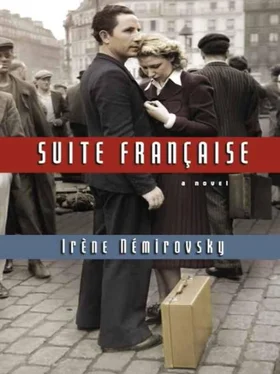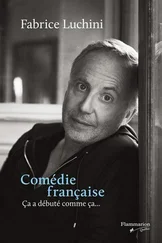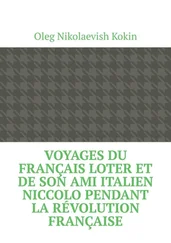Irène Némirovsky - Suite Française
Здесь есть возможность читать онлайн «Irène Némirovsky - Suite Française» весь текст электронной книги совершенно бесплатно (целиком полную версию без сокращений). В некоторых случаях можно слушать аудио, скачать через торрент в формате fb2 и присутствует краткое содержание. Жанр: Историческая проза, на английском языке. Описание произведения, (предисловие) а так же отзывы посетителей доступны на портале библиотеки ЛибКат.
- Название:Suite Française
- Автор:
- Жанр:
- Год:неизвестен
- ISBN:нет данных
- Рейтинг книги:4 / 5. Голосов: 1
-
Избранное:Добавить в избранное
- Отзывы:
-
Ваша оценка:
- 80
- 1
- 2
- 3
- 4
- 5
Suite Française: краткое содержание, описание и аннотация
Предлагаем к чтению аннотацию, описание, краткое содержание или предисловие (зависит от того, что написал сам автор книги «Suite Française»). Если вы не нашли необходимую информацию о книге — напишите в комментариях, мы постараемся отыскать её.
"A book of exceptional literary quality… it has the kind of intimacy found in the diary of Anne Frank."-The Times Literary Supplement
"Heroic… a novel about a nightmare in which the author is entirely embedded."-ANITA BROOKNER, The Spectator
"An exceptionally forceful and frank testimony… a real find. A masterpiece."-L'Express
"Remarkable as the story of the publication of Suite Française is, it will finally be of anecdotal interest compared with the importance of the book. Here is the work of a fine novelist at the top of her form, writing about the fate of her adopted country with a pitiless clarity."-Evening Standard
Suite Française — читать онлайн бесплатно полную книгу (весь текст) целиком
Ниже представлен текст книги, разбитый по страницам. Система сохранения места последней прочитанной страницы, позволяет с удобством читать онлайн бесплатно книгу «Suite Française», без необходимости каждый раз заново искать на чём Вы остановились. Поставьте закладку, и сможете в любой момент перейти на страницу, на которой закончили чтение.
Интервал:
Закладка:
25
When Father Péricand found himself forced to continue the journey on foot, the boys filing after him, each carrying a blanket and haversack and dragging their feet in the dust, he had decided to head away from the Loire, an area fraught with danger, towards the woods; but soldiers had already set up camp there and, since planes were bound to spot them from the air, the danger seemed just as great amid the trees as on the river banks. And so, leaving the main road, he took a path covered with stones, virtually a footpath, trusting his instinct to lead him to some isolated house, just as when, in the mountains, he led his group of skiers towards a refuge hidden by the fog or snowstorm. It was a beautiful June day, so brilliant and hot that the boys felt intoxicated. Silent until now and well-behaved, too well-behaved, they began jostling each other, shouting, and Father Péricand could hear laughter and snatches of whispered songs. He listened more closely and, hearing an obscene refrain mumbled behind him, as if through half-closed lips, he suggested they all sing a song together. He struck up, energetically enunciating the words, but only a few voices joined in. After some moments everyone fell silent. He too walked on without speaking, wondering what this sudden freedom might awaken within these poor children, what disturbing desires? What dreams? One of the younger ones stopped suddenly and cried, "A lizard, oh! A lizard! Look!" In the sunshine, between two rocks, agile tails appeared, disappeared; they could see their delicate flat heads; their throats pulsating in and out to a rapid, frightened beat. The boys watched, entranced. Some of them even knelt down on the path. The priest waited a few moments, then waved to them to move on. The children meekly got up, but at that very moment pebbles flew out of their hands with such dexterity, such surprising speed, that two of the lizards-the most beautiful, the biggest, their skin a delicate blue-grey colour-were killed on the spot.
"Why did you do that?" the priest exclaimed, upset.
No one replied.
"Well, why? What a spineless act!"
"But they're like snakes, they bite," said a boy with a long pointed nose and a pale, dazed expression.
"Don't be ridiculous! Lizards are harmless."
"Oh! We didn't know, Father," he replied in a sly voice, with a feigned innocence that didn't fool the priest.
But he knew it was neither the time nor the place to insist; he just nodded briefly as if he were satisfied with the answer and added, "Well, now you know."
He organised them into lines to follow him. Until now he had let them walk as they liked, but he suddenly thought that some of them might try to run away. They obeyed him so perfectly, so mechanically-no doubt used to hearing the whistle blow, to standing in line, to being docile, to enforced silence-that it broke his heart. He glanced at their faces, which had suddenly became glum and lifeless-as closed as a house when the door is locked, the life within withdrawn, absent or dead.
"We'd better hurry up if we want to find shelter tonight," he said. "As soon as I know where we'll be sleeping and after we eat (you'll be getting hungry soon!) we can make a campfire and you can stay outdoors as long as you like."
He walked among them, talked to them about his young boys from the Auvergne, about skiing, mountain climbing, trying to interest them, to get closer to them. All in vain. They didn't even seem to be listening; he realised that anything he said to them-encouragement, reprimands, information-would never sink in, for their souls were shut off, walled up, secret and silent.
"If only I could look after them for longer," he thought to himself. But in his heart he knew he didn't really want to. He only wanted one thing: to be rid of them as soon as possible, to be relieved of his responsibility and this feeling of unease he felt weighing down on him. The duty of love which, until now, he had felt was almost simple, so great was the Grace of God within him, now seemed almost impossible to feel. "Even though," he thought humbly, "it would mean that, for the first time perhaps, I would really have to try, it would be a true sacrifice. How weak I am!"
He called over one of the younger boys who was always lagging behind. "Are you tired? Do your shoes hurt?"
Yes, he had guessed correctly: the lad's shoes were too tight and hurting him. He took his hand to help him, talking to him quietly and, since the boy was slouching-his shoulders stooped, his back round-the priest gently placed two fingers round his neck and pulled him up straight. The young boy didn't resist. In fact, with a distant, indifferent look on his face, he leaned his neck against the hand that held it, and this light, insistent pressure, this strange, ambiguous caress (or rather this expectation of a caress) made the priest blush. He took the child by the chin and tried to look into his eyes, but his eyelids were lowered and he couldn't see into them.
He walked faster, trying to collect himself with an internal dialogue, as he always did at sad moments. It wasn't exactly what you'd call a prayer. Often it wasn't even a collection of words recognisable as human speech. It was a kind of intangible meditation from which he emerged bathed in joy and peace. But both abandoned him today. The pity he felt was corrupted by a stirring of anxiety and bitterness. It was only too clear that these poor wretches were lacking Grace: His Grace. He wanted to be able to shower them with Grace, inundate their barren hearts with love and faith. It would take but a sigh from our Crucified Lord, the flutter of a wing from one of His angels to bring about the miracle, but nevertheless he, Philippe Péricand, had been chosen by God to soften them, to unlock their souls, to prepare them to receive God. He suffered because he was incapable of bringing it about. He had been spared the moments of doubt and the sudden hardening of the soul that take hold of some believers, abandoning them, not in the hands of the princes of this world, but in a terrible darkness halfway between Satan and God.
His temptation was different: it was a kind of impatience to be holy, the desire to gather liberated souls around him, a ripple of urgency which, once he had opened someone's heart to God, propelled him towards other conquests, leaving him forever frustrated, dissatisfied, disappointed with himself. It wasn't enough! No, Lord Jesus, it wasn't enough! The old heathen who had confessed, taken Communion in his final hour, the sinful woman who had renounced vice, the pagan who had wanted to be baptised. Not enough, no, not enough! He recognised something similar in the way a greedy man hoards his gold. And yet, no, it wasn't exactly like that. It reminded him of certain moments he'd spent at the river when he was a child: the quiver of joy every time he caught a fish (yet now he didn't understand how he could have liked such a cruel game, and even found it difficult to eat fish; vegetables, dairy products, fresh bread, chestnuts and that country soup so thick the spoon stands straight up in it all by itself, these were all he needed to sustain him). But as a child he had been fanatical about fishing and he remembered his anguish when the sun began to set on the water, when he had hardly caught any fish and he knew the day was nearly over. He had been criticised for his excessive scruples. He himself feared they might not come from God but from an Other… Yet never had he felt that anguish as he did today, on this journey, beneath this sky where lethal planes sparkled, among these children whose physical bodies were the only thing he could hope to save…
They had been walking for some time when they saw the first houses of a village. It was very small, intact, empty: its inhabitants had fled. However, before leaving, they had firmly secured the doors and windows; they had taken their dogs with them, carried the rabbits and chickens. Only a few cats were left behind, sleeping in the sunshine on garden paths or walking along the low roofs, looking replete and tranquil. It was the time of year when all the roses were in bloom, so above every doorway beautiful flowers opened their petals, generously, happily, inviting the wasps and bumblebees to drink from deep inside their hearts. This village abandoned by its people, where no footsteps, no voices could be heard and where all the sounds of the countryside were absent-the creaking of wheelbarrows, the cooing of pigeons, the clucking from the poultry yards-this village had become the kingdom of the birds, the bees and the hornets. Philippe thought he had never heard so many vibrant, joyous songs nor seen so many swarms all around him. Hay, strawberries, blackcurrants, the little sweet-smelling flowers in the borders, each flower bed, each lawn, each blade of grass gave off a soft buzzing sound, like a spinning wheel. All these small plots had been tended with loving care; all of them had an archway covered with roses, a tunnel where you could still see the last lilacs of the season, two iron chairs, a bench in the sunshine. The redcurrants were enormous, transparent and golden.
Читать дальшеИнтервал:
Закладка:
Похожие книги на «Suite Française»
Представляем Вашему вниманию похожие книги на «Suite Française» списком для выбора. Мы отобрали схожую по названию и смыслу литературу в надежде предоставить читателям больше вариантов отыскать новые, интересные, ещё непрочитанные произведения.
Обсуждение, отзывы о книге «Suite Française» и просто собственные мнения читателей. Оставьте ваши комментарии, напишите, что Вы думаете о произведении, его смысле или главных героях. Укажите что конкретно понравилось, а что нет, и почему Вы так считаете.

![Константин Бальмонт - Константин Бальмонт и поэзия французского языка/Konstantin Balmont et la poésie de langue française [билингва ru-fr]](/books/60875/konstantin-balmont-konstantin-balmont-i-poeziya-francuzskogo-yazyka-konstantin-balmont-et-thumb.webp)










